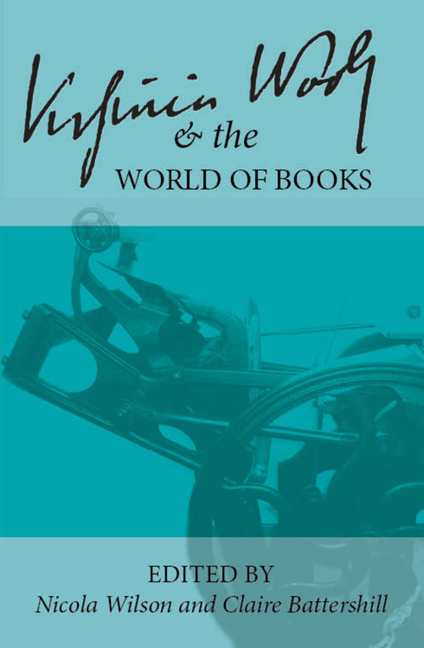 Virginia Woolf and the World of Books
Virginia Woolf and the World of Books Book contents
- Frontmatter
- Contents
- Introduction
- List of Abbreviations
- Keynote
- In the Archives
- Craftsmanship
- “Wood is a pleasant thing to think about”: William Blake and the Hand-Printed Books of the Hogarth Press
- Virginia Woolf, the Hogarth Press, and “Short Things”
- “Scarcely a Brick to Be Seen”: Breaking Boundaries in “Kew Gardens” and “The Mark on the Wall”
- Virginia Woolf's Arts and Craftsmanship
- The Hogarth Press
- Hours in A Library
- The Art of the Book
- The Art of the Narrative
- Making New Books: Creative Approaches
- The Book in the World: Woolf's Global Reception
- Editing and Teaching Woolf
- Intertextuality
- Lives in Writing
- Notes on Contributors
Virginia Woolf, the Hogarth Press, and “Short Things”
from Craftsmanship
- Frontmatter
- Contents
- Introduction
- List of Abbreviations
- Keynote
- In the Archives
- Craftsmanship
- “Wood is a pleasant thing to think about”: William Blake and the Hand-Printed Books of the Hogarth Press
- Virginia Woolf, the Hogarth Press, and “Short Things”
- “Scarcely a Brick to Be Seen”: Breaking Boundaries in “Kew Gardens” and “The Mark on the Wall”
- Virginia Woolf's Arts and Craftsmanship
- The Hogarth Press
- Hours in A Library
- The Art of the Book
- The Art of the Narrative
- Making New Books: Creative Approaches
- The Book in the World: Woolf's Global Reception
- Editing and Teaching Woolf
- Intertextuality
- Lives in Writing
- Notes on Contributors
Summary
Woolf 's short fiction has rarely been viewed as a serious literary output, at times considered an infrequently practiced hobby to which too much attention shouldn't be paid. Julia Briggs has observed that the short story “remained for Woolf a place for experiment and an occasion for learning,” stating that “the value was primarily for her, rather than her readers” (224), so casting the form as a private rather than public pursuit. Yet the first Hogarth Press publication comprised two works of short fiction: one by Virginia, one by Leonard. Under the simple, bold title Two Stories, it was the short fiction genre that was chosen to launch a private enterprise onto the public stage. In fact, it could be said that the short story was what made Woolf a modernist—it was in writing “The Mark on the Wall” that she found a suitably experimental voice for her fast-roving meditations. Yet Woolf often viewed her short fiction with an excess of diffidence, describing her stories as mere “short things” (L2 167). This chapter will dwell on the affinities between the Hogarth Press and Woolf 's stories, and begin to explore the free literary thinking they encouraged.
In her 1981 essay “The Short Story—The Long and the Short of It,” Mary Louise Pratt explores the canonical sidelining of short fiction from several approaches. One explanation she puts forward for the genre's persistent under-evaluation is summed up in the following statement: “The shorter a performance, the less the participants have at stake in it, and the less is lost if it fails in any way” (97). On one level, this statement bears resonance with the business decision which led to short fiction being the first product of the Hogarth Press's first mechanical embodiment, the handpress. Stories are of course shorter than novels and do not require the sophisticated type arrangement that poetry can demand. Consequently, their shortness confers a reduced financial investment.
Yet, with thirty-four densely-packed pages, the printing process was laborious and the first handpress only allowed two pages of type to be set at a time. Two Stories also included woodcuts by Dora Carrington and Woolf recorded the difficulty they had in printing them (L2 159).
- Type
- Chapter
- Information
- Virginia Woolf and the World of BooksSelected Papers from the Twenty-seventh Annual International Conference on Virginia Woolf, pp. 50 - 55Publisher: Liverpool University PressPrint publication year: 2018


